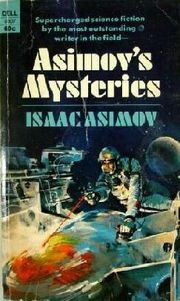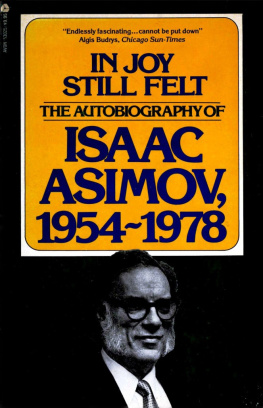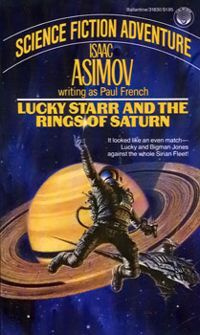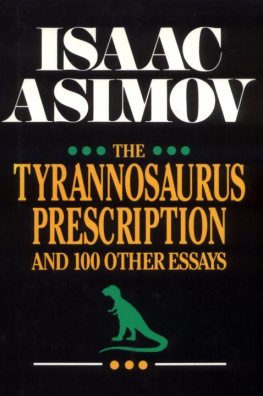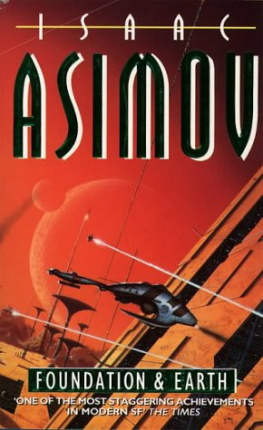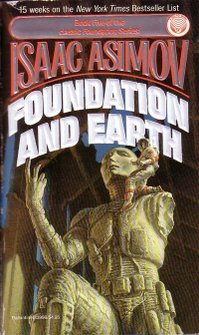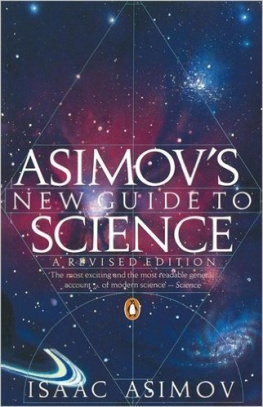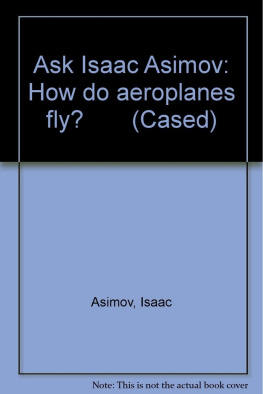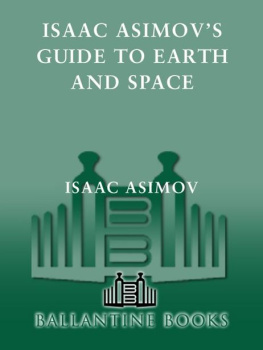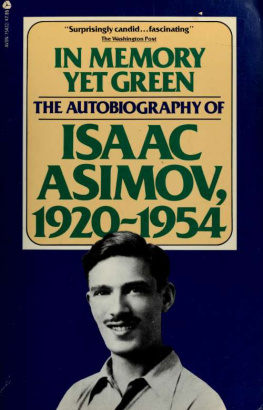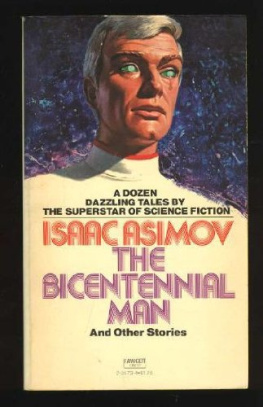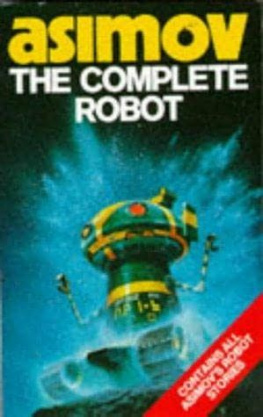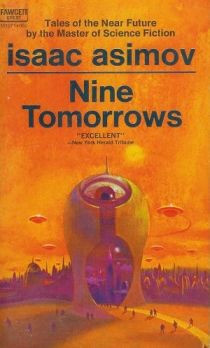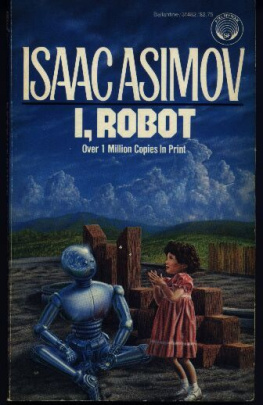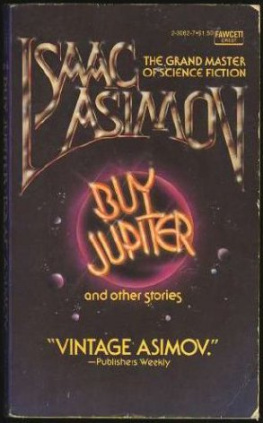Isaac Asimov
Asimov's Mysteries
Introduction
There is a tendency for many people who don't know any better to classify science fiction as just one more member of the group of specialized literatures that include mysteries, westerns, adventures, sports stories, love stories, and so on.
This has always seemed odd to those who know science fiction well, for s.f. is a literary response to scientific change, and that response can run the entire gamut of the human experience. Science fiction, in other words, includes everything.
How does one differentiate between a science fiction story and an adventure story, for instance, when so much s.f. is so intensely adventurous as to leave the ordinary stories of the type rather pale? Surely a trip to the moon is first of all an adventure of the most thrilling kind, whatever else it is.
I have seen excellent science fiction stories that fall into unusual classifications and bring great enrichment to what it had touched. Arthur C. Clarke wrote a delightful 'western' -but it took place under the sea, and it had dolphins in place of cattle. Its name was 'Home on the Range,' however, and it fitted.
Clifford D. Simak wrote 'Rule 18' which is a pure sports story, but one that involved time-travel, so that the coach of Earth's team could collect all-time greats with whom to win the annual game with Mars.
In 'The Lovers,' Philip Jose Farmer struck a telling variation on ordinary romance by writing a sober and moving tale of love that crossed the boundary line, not of religion or color, but of species.
Oddly enough, it was the mystery form that seemed most difficult to amalgamate with science fiction. Surely this is unexpected. One would think that science fiction would blend easily with the mystery. Science itself is so nearly a mystery and the research scientist so nearly a Sherlock Holmes.
And if we want to reverse things, are there not mysteries that make use of the 'scientific mind'? R. Austin
Freeman's Dr. Thorndyke is an example of a well known and successful (fictional) scientist-detective. And yet science fiction writers seemed to be inhibited in the face of the science fiction mystery.
Back in the late 1945, this was finally explained to me. I was told that 'by its very nature' science fiction would not play fair with the reader. In a science fiction story, the detective could say, 'But as you know, Watson, ever since 2175, when all Spaniards learned to speak French, Spanish has been a dead language. How came Juan Lopez, then, to speak those significant words in Spanish!' Or else, he could have his detective whip out an odd device and say, 'As you know, Watson, my pocket-frannistan is perfectly capable of detecting the hidden jewel in a trice.'
Such arguments did not impress me. It seemed to me that ordinary mystery writers (non-science-fiction variety) could be just as unfair to the readers. They could deliberately hide a necessary clue. They could introduce an additional character from nowhere. They could simply forget about something over which they had been making a great deal of fuss, and mention it no more. They could do anything. The point was, though, that they didn't do anything. They stuck to the rule of being fair to the reader. Clues might be obscured, but not omitted. Essential lines of thought might be thrown out casually, but they were thrown out. The leader was remorselessly misdirected, misled, and mystified, but he was not cheated.
It seemed, then, a matter to be taken obviously for granted that the same would apply to a science fiction mystery. You don't spring new devices on the reader and solve the mystery with them. You don't take advantage of future history to introduce ad hoc phenomena. In fact, you carefully explain all facets of the future background well in advance so the reader may have a decent chance to see the solution. The fictional detective can make use only of facts known to the reader in the present or of 'facts' of the fictional future, which will be carefully explained beforehand. Even some of the real facts of our present ought to be mentioned if they are to be used-just to make sure the reader is aware of the world now about him.
Once all this is accepted, not only does it become obvious that the science fiction mystery is a thoroughly acceptable literary form, but it also becomes obvious that it is a lot more fun to write and read, since it often has a background that is fascinating in itself quite apart from the mystery.
But talk is cheap, so I put my typewriter where my mouth was, and in 1953 wrote a science fiction mystery novel called The Caves of Steel (published, 1954). It was accepted by the critics as a good science fiction novel and a good mystery and after it appeared I never heard anyone say that science fiction mysteries were impossible to write. I even wrote a sequel called The Naked Sun (published, 1957) just to show that the first book wasn't an accident.
Between and after these novels, moreover, I also wrote several short stories intended to prove that science fiction mysteriescould be written in all lengths.
These shorter science fiction mysteries (including some boarderline cases) are included in this volume in order of publication. Judge for yourself.
The Singing Bell
Louis Peyton never discussed publicly the methods by which he had bested the police of Earth in a dozen duels of wits and bluff, with the psychoprobe always waiting and always foiled. He would have been foolish to do so, of course, but in his more complacent moments, he fondled the notion of leaving a testament to be opened only after his death, one in which his unbroken success could clearly be seen to be due to ability and not to luck.
In such a testament he would say, 'No false pattern can be created to cover a crime without bearing upon it some trace of its creator. It is better, then, to seek in events some pattern that already exists and then adjust your actions to it.'
It was with that principle in mind that Peyton planned the murder of Albert Cornwell.
Cornwell, that small-time retailer of stolen things, first approached Peyton at the latter's usual table-for-one at Grinnell's. Cornwell's blue suit seemed to have a special shine, his lined face a special grin, and his faded mustache a special bristle.
'Mr. Peyton,' he said, greeting his future murderer with no fourth-dimensional qualm, 'it is so nice to see you. I'd almost given up, sir, almost given up.'
Peyton, who disliked being approached over his newspaper and dessert at Grinnell's, said, 'If you have business with me, Cornwell, you know where you can reach me.' Peyton was past forty and his hair was past its earlier blackness, but his back was rigid, his bearing youthful, his eyes dark, and his voice could cut the more sharply for long practice.
'Not for this, Mr. Peyton,' said Cornwell, 'not for this. I know of a cache, sir, a cache of... you know, sir.' The forefinger of his right hand moved gently, as though it were a clapper striking invisible substance, and his left hand momentarily cupped his ear.
Peyton turned a page of the paper, still somewhat damp from its tele-dispenser, folded it flat and said, 'Singing Bells?'
'Oh, hush, Mr. Peyton,' said Cornwell in whispered agony Peyton said. 'Come with me.'
They walked through the park. It was another Peyton axiom that to be reasonably secret there was nothing like a low-voiced discussion out of doors.
Cornwell whispered, 'A cache of Singing Bells; an accumulated cache of Singing Bells. Unpolished, but such beauties, Mr. Peyton.'
'Have you seen them?'
'No, sir, but I have spoken with one who has. He had proofs enough to convince me. There is enough there to enable you and me to retire in affluence. In absolute affluence, sir.'
Next page
